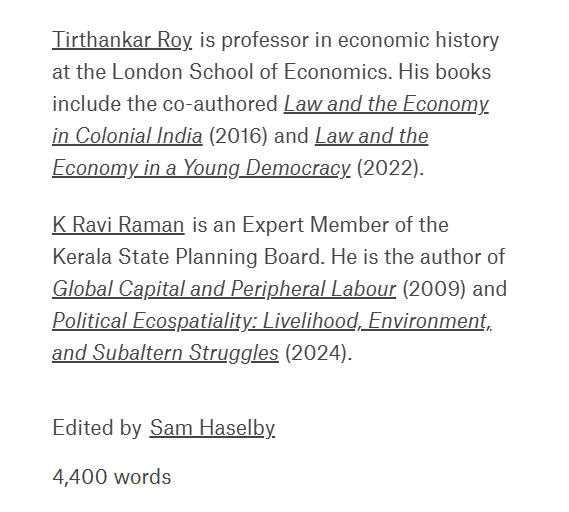Welcome to DU!
The truly grassroots left-of-center political community where regular people, not algorithms, drive the discussions and set the standards.
Join the community:
Create a free account
Support DU (and get rid of ads!):
Become a Star Member
Latest Breaking News
Editorials & Other Articles
General Discussion
The DU Lounge
All Forums
Issue Forums
Culture Forums
Alliance Forums
Region Forums
Support Forums
Help & Search
How Kerala got rich

Fifty years ago it was one of India’s poorest states, now it is now one of the richest. How did Kerala do it?
https://aeon.co/essays/how-did-kerala-go-from-poor-to-prosperous-among-indias-states


India is a union of 28 states (provinces). The population in some of these states is bigger than that of the largest European countries. For example, Uttar Pradesh is home to more than 240 million people, almost three times the population of Germany. Although a part of a federal union, every state has a unique history, shaped by its environment and natural resources, princely or British colonial heritage, language and culture. Since the end of British rule in the region in 1947, their economic trajectories have diverged, too.
With roughly 35 million people, Kerala, which sits along India’s southwestern tip on the Indian Ocean, is among the smaller Indian states, though it is densely populated. In the 1970s, Kerala’s average income was about two-thirds of the Indian average, making it among the poorest states in India. This difference persisted through the 1980s. In the coming decades, a miracle occurred. Kerala, one of the poorest regions in India, became one of the richest. In 2022, Kerala’s per-capita income was 50-60 per cent higher than the national average. What happened?
Even when it was poor, Kerala was different. Though income-poor, Kerala enjoyed the highest average literacy levels, health conditions and life expectancy – components of human development – in all of India. Among economists in the 1970s and ’80s and among locals, ‘Kerala is different’ became a catchphrase. But why, and different from whom? One big difference Kerala presented was with North India, which had an abysmal record of education and healthcare. While the population grew at more than 2 per cent per year in the rest of India, Kerala’s population growth rates remained significantly lower in the 1970s. High literacy and healthcare levels contributed to this transition.
Kerala’s unusual mix of high levels of human development and low incomes drew wide attention, including from leading scholars. Among the most influential writers, K N Raj played a big part in projecting Kerala as a model for other states. Anthropologists like Polly Hill and Robin Jeffrey drew attention to some of the unique features of the society that led to these achievements. In a series of influential works, the Nobel-laureate Amartya Sen and his co-author the economist Jean Drèze praised Kerala’s development model for prioritising health and education, even with limited resources, and claimed that this pathway led to significant improvements in quality of life. Kerala vindicated the intuition that Sen and others held that health and education improved wellbeing and shaped economic change by enhancing choices and capabilities.
snip
3 replies
 = new reply since forum marked as read
Highlight:
NoneDon't highlight anything
5 newestHighlight 5 most recent replies
= new reply since forum marked as read
Highlight:
NoneDon't highlight anything
5 newestHighlight 5 most recent replies
How Kerala got rich (Original Post)
Celerity
Thursday
OP
Key takeaway from excerpt: "prioritising health and education"; taking care of the fundamentals. Thanks for posting. .nt
Bernardo de La Paz
Thursday
#3
gab13by13
(27,322 posts)1. My good buddy at work was from Kerala
His father was a tailor, which was well respected. He told me when you get off the plane at Kerala you smell spices.
wanderer54
(68 posts)2. Communist Party of India (CPI)
was first elected to govern in 1957. They and other leftist coalitions were the government many times over the years.
Land Reform was done in the 1960s
Health and Education
Bernardo de La Paz
(53,703 posts)3. Key takeaway from excerpt: "prioritising health and education"; taking care of the fundamentals. Thanks for posting. .nt